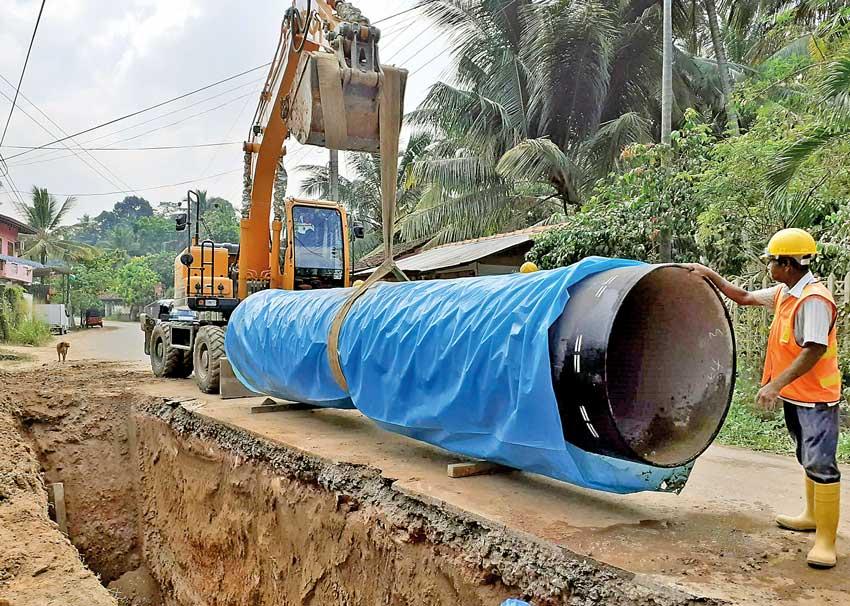22 Jun 2020 - {{hitsCtrl.values.hits}}

 Many small and medium-sized enterprises (SMEs) complain about lack of access to finance, lack of government support, insufficient customer preference for local products and services and so on. While these may be true, these are not the only reasons some SMEs are unsuccessful.
Many small and medium-sized enterprises (SMEs) complain about lack of access to finance, lack of government support, insufficient customer preference for local products and services and so on. While these may be true, these are not the only reasons some SMEs are unsuccessful.
Low-cost funds are not the panacea for all ills. High protection could only be a temporary relief. SMEs must introspect and make a paradigm shift in their structure, operations and customer service philosophy, if they wish to grow and be a force to be reckoned with.
Planning
I was contemplating this article for some time but an incident today triggered it. The Water Supply and Drainage Board is currently replacing the old cast iron water lines with flexible pipes. The work is subcontracted to SME firms. Watching the digging of the trenches before the onset of the COVID-19 pandemic, I was surprised at the poor methods used. Productivity
was low.
Then the pipes were laid and the trenches covered with earth, quarry dust and ¾” metal. Applying the top layer of premix bitumen was delayed because of the disruption caused by the pandemic and was carried out yesterday. As of this morning, our private road looked neat with all the broken areas now patched up. But later in the day, another team arrives and digs up some spots again to fix the connections.
My inquiry why the tarring could not have been done after completing the connections was greeted with a blank stare, as if to stay “what a silly question. Don’t you know that we love breaking up roads as soon as they are tarred?” A little bit of planning would have saved much time and money.
In my younger days as an engineer, I was taught ‘critical path planning’ and later on in senior management positions, I used it even for organising dealer conferences, the establishment of a new retail shop or any project-like event. I can guarantee that planning makes a significant difference and is cost-efficient, more productive and enables on-time delivery. This is just
an example.
I was told by a foreign management expert that Sri Lankans do not plan because it is not in their blood. He said, “Westerners, who experience climatic seasons, had planning in their blood, for millennia” and in ancient times their people had to plan very well the collecting of firewood and storing of food for the winter season.
Quality
Quality is another issue which I have faced dealing with small and micro industries. “Do it right the first time” is a concept alien to them. They take the path of least resistance and finally end up with costly remedial work. Good service quality is rare. Overpromising is the norm and my efforts at convincing them to under-promise and over-deliver have often been in vain.
The thinking is very short term and making a quick buck is the priority. Building a long-term reputation demonstrating superior quality and reliability, despite initial margins being small, is only understood by a few. Creating a high-quality enterprise is hardly a vision.
Productivity
Most SMEs are ignorant of even the basic techniques of productivity, which have been practised in the western world for over 120 years. Productive factory layouts, good work station layouts, designing work stations and the work itself and following the principles of motion economy are unheard of. This results in high labour, energy and material costs.
I remember an assignment in a strawboard factory many years ago, where simple techniques improved productivity substantially. I am reminded of the words of Professor Kawase of Keio University, Japan, who said, “The primary role of the industrial engineer is to teach the simple productivity techniques to the entire organisation and encourage frontline workers to
make improvements.”
My experience is that workers with such knowledge have produced astounding results.
The Japanese 5S method scientifically applied can significantly improve productivity, improve quality, reduce cost, make timely deliveries possible and improve safety and also worker morale. A well-structured incentive scheme also has a space in improving productivity.
Management structure
During a course in Sweden, I visited a typical entrepreneur, who was successful in developing a unique product. When he expanded, he brought in a professional board of directors to guide him and he relegated himself to the position of general manager. When the business grew further and managing finances became more complicated, he downgraded himself further to the position of sales manager and brought in a retired experienced professional as the managing director and an accountant.
In Sri Lanka, an entrepreneur would be reluctant to lose control with a similar arrangement and will continue to hold the positions of chairman, managing director and production manager, until he reaches his level of incompetence and jeopardises the whole business. Moreover, he would be inclined to fill the organisation with family and friends whose loyalty is preferred to superior competence.
Finance dimension
Some of the failures of SMEs have stemmed from the fact that the entrepreneurs were engineers or technical people, who had a good business model, a technically sound product and impressed the banks but the business crashed while it was growing. If the credit period given to your customers is more than the credit period you receive from your suppliers, your cash flow problem is compounded when you grow. So, it is always advisable to have a finance and accounting professional on board, who could see the early warning signs and take remedial action.
There is a saying that an engineer should be on tap and never on top. Being an engineer, I cannot subscribe to this. There is also a saying that had an accountant been given a say in the NASA programme, putting a man on the moon would never have happened because a return on the investment would never have been calculated.
Likewise, while an entrepreneur should not be inhibited in his dreams and innovations, he must be tempered with basic business skills.
Business game
During a course in Japan, a group of us industrial engineers of Asian countries underwent a business game for one week. We were divided into different companies competing in the same market with the same product and had to divide ourselves into different roles such as production manager, sales manager, finance manager, president, etc. The game had 10 or 20 quarters and followed a past actual business cycle of Japan.
Halfway through the game, some companies were already in trouble. Before the end of the week, two companies were bankrupt. The organisers were happy. Their philosophy was, “It is better to go bankrupt in a game and learn from it rather than go bankrupt in real life.”
There are many other areas where SMEs need to improve their skills. Solving the access to finance problem, debt moratoria and low-interest rates may give them some breathing space for now but the deeper and more fundamental issues need to be addressed to foster a resilient and thriving SME sector in Sri Lanka.
(Sunil G. Wijesinha is a consultant in business excellence, productivity and Japanese style management, former President of the National Chamber of Commerce of Sri Lanka and former Chairman, MD and Director of several banks)
25 Dec 2024 2 hours ago
25 Dec 2024 2 hours ago
25 Dec 2024 3 hours ago
25 Dec 2024 4 hours ago
25 Dec 2024 5 hours ago